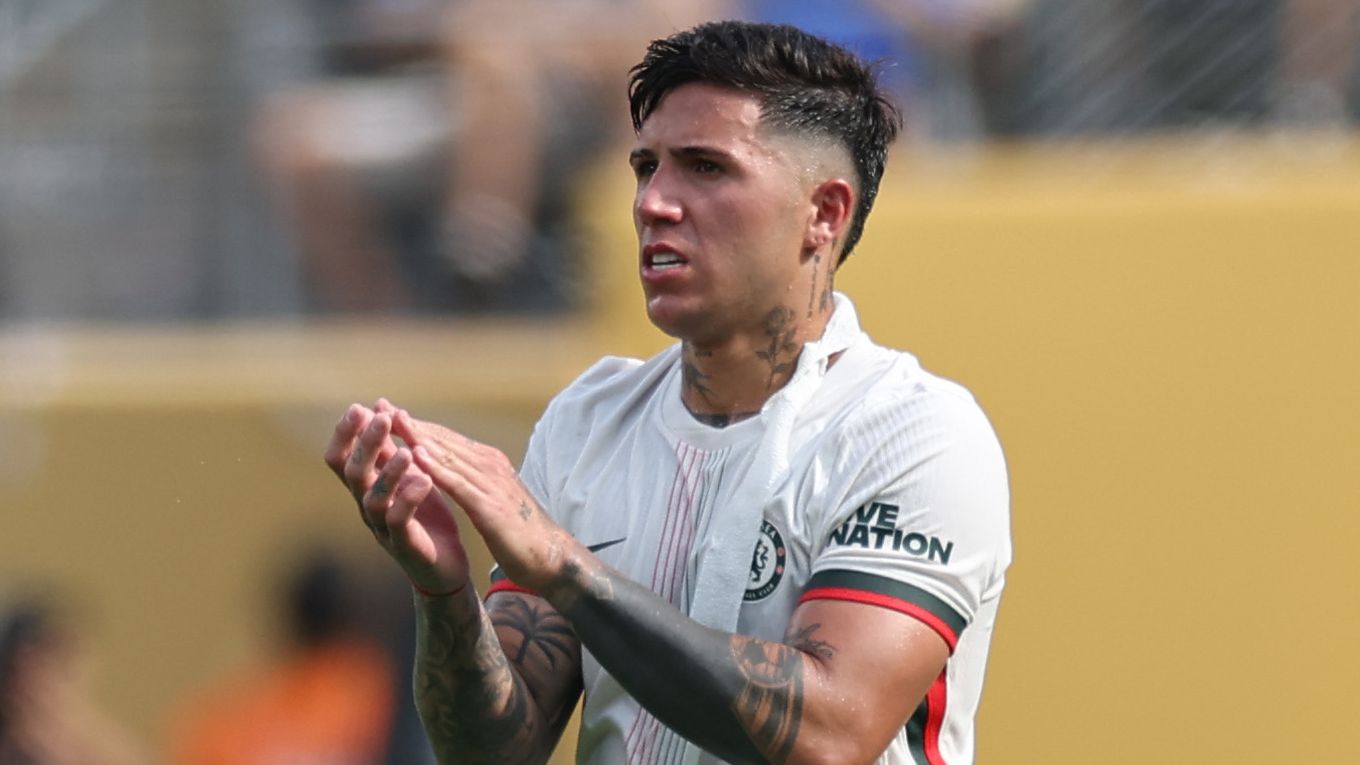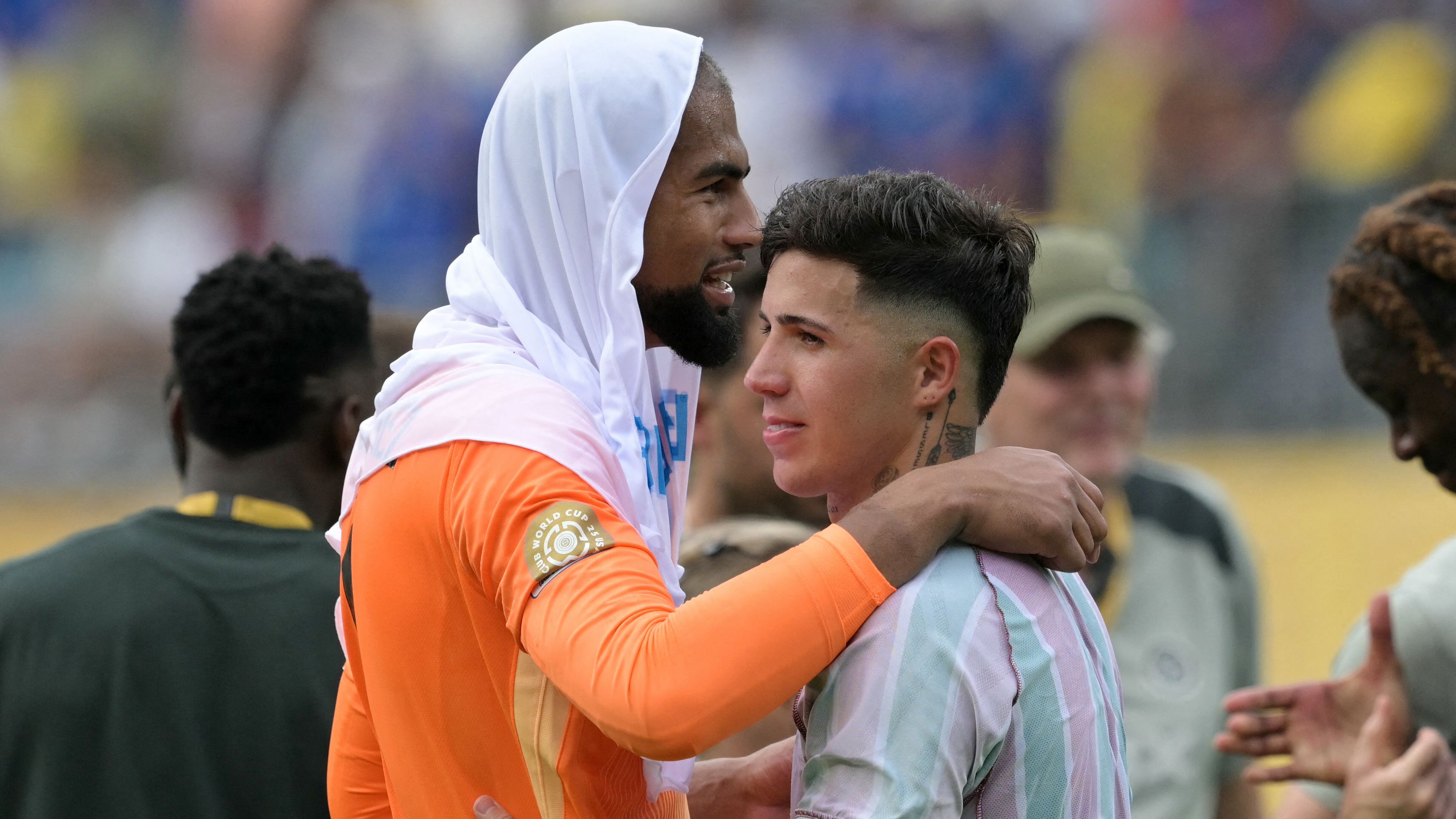Revealing the Perils of Playing in Sweltering Conditions
In the high-stakes world of professional football, Enzo Fernandez‘s firsthand account underscores the serious risks posed by extreme weather during major tournaments, urging a reevaluation of event scheduling to protect athletes and enhance the viewing experience.
- Fernandez voices concerns over FIFA’s event timing
- Intense heat caused him to feel light-headed
- Club World Cup final set to begin at 3 PM ET



The Midfielder’s Struggle Amid Extreme Heatwaves
The Argentine player needed on-site medical care after being overcome by dizziness in the oppressive heat at MetLife Stadium on Tuesday, sparking widespread debate about the safety of staging premier competitions in such harsh environments.
Fernandez Shares His Intense Encounter
During a media session on Friday, the footballer was forthright in describing his ordeal, emphasizing the severity of the conditions without holding back.
“I appreciate you bringing that up, as the heat was truly overwhelming,” he explained. “In the midst of the action, I felt unsteady and had to drop to the field. Competing under these temperatures poses a real threat to everyone’s well-being.”
Impact on the Game and Its Audience
According to Fernandez, the adverse conditions didn’t just affect participants; they also diminished the excitement of the match and the enjoyment for spectators alike.
“It’s particularly tough on the event itself, affecting fans in the stands and those tuned in remotely. The flow of play changes dramatically, with everything moving at a slower pace,” he noted.
Calling for Reforms in FIFA’s Tournament Planning
As criticism mounts over FIFA’s choice to broaden the Club World Cup, thereby intensifying the already crowded football schedule, Fernandez seized the moment to advocate for adjustments that could influence future events, including the 2026 World Cup across the United States, Canada, and Mexico.
“It’s my hope that organizers will revise the timetable soon, making sure the games deliver more thrill and keep the sport vibrant and captivating,” he remarked.
Chelsea’s Path Forward in the Tournament
Thanks to a pair of goals from the team’s fresh acquisition Joao Pedro, Chelsea advanced beyond Fluminense and is now gearing up for a critical encounter with the current European title holders, Paris Saint-Germain. Set for Sunday at 3 p.m. ET back at MetLife Stadium, the match will likely face similar high temperatures, raising ongoing worries about athletes’ capacity to perform at peak levels in these demanding circumstances.
The Match and the Incident
In the high-stakes world of international football, Chelsea’s Enzo Fernandez faced a terrifying moment during their Club World Cup clash with Fluminense. Picture this: the midfielder, known for his dynamic play and endurance on the pitch, came dangerously close to fainting amid what he later described as “extremely dangerous” conditions. This event highlights the physical toll that extreme weather and intense competition can take on athletes, making it a crucial topic for Chelsea fans and sports enthusiasts tracking player health in major tournaments like the Club World Cup.
Enzo Fernandez, Chelsea’s Argentine star, opened up about the grueling conditions that pushed him to his limits. During the match, factors like soaring temperatures and high humidity turned the game into a battle against the elements, not just the opposition. It’s moments like these that remind us why player safety in football is non-negotiable, especially in global events where environmental challenges can escalate quickly.
Enzo Fernandez’s Account of the ‘Extremely Dangerous’ Conditions
Enzo didn’t hold back when sharing his experience, emphasizing how the conditions felt life-threatening. He spoke about the overwhelming heat and physical strain that left him dizzy and on the verge of collapsing, a stark wake-up call for anyone following Chelsea’s journey in the Club World Cup. His words underscore the realities of playing under such duress, where even top-tier athletes like Fernandez can be caught off guard.
Key Factors That Contributed to the Danger
- Extreme Heat and Humidity: The match environment was marked by temperatures exceeding 30°C (86°F) combined with high humidity, which can lead to rapid dehydration and heat exhaustion. Enzo noted how these elements made every movement feel twice as exhausting, a common issue in Club World Cup games held in varying climates.
- Physical Demands of the Game: As a midfielder, Fernandez covers immense ground, and the added pressure of a knockout stage amplified the risk. He described feeling lightheaded mid-game, a symptom that could have been exacerbated by the fast-paced nature of Chelsea’s tactics against Fluminense.
- Inadequate Acclimatization: Players often travel across time zones for events like the Club World Cup, and Enzo highlighted how this lack of time to adjust played a role in his near-fainting episode. It’s a reminder that teams need better preparation strategies to mitigate these risks.
These details from Fernandez’s description paint a vivid picture of the challenges, helping readers understand why such conditions are a growing concern in modern football.
Health Implications for Athletes in High-Stakes Matches
Delving deeper, Enzo’s experience sheds light on the broader health risks associated with playing in extreme conditions during events like the Club World Cup. Nearly fainting isn’t just a one-off scare; it can signal serious issues like heat stroke or cardiovascular strain, which we’ve seen in other football matches over the years.
Symptoms and Signs to Watch For
- Early Warning Signs: Dizziness, nausea, and blurred vision, as Enzo experienced, are red flags that players and coaches should never ignore. In Chelsea’s game against Fluminense, these symptoms forced a brief pause, emphasizing the need for immediate medical intervention.
- Long-Term Effects: Beyond the immediate game, such incidents can lead to fatigue buildup or even injuries in subsequent matches, affecting a player’s performance in Chelsea’s broader season. Enzo’s openness about his recovery process adds value, showing how rest and monitoring are key to bouncing back.
- Psychological Impact: It’s not just physical-Enzo mentioned the mental toll, like heightened anxiety in future games, which is something many Chelsea supporters can relate to when their stars face adversity.
This level of detail makes the topic relatable and informative, encouraging readers to stay informed about Club World Cup health protocols.
How Football Organizations Are Responding
In response to stories like Enzo Fernandez’s, football bodies are stepping up efforts to address dangerous conditions in tournaments. For instance, updates to Club World Cup regulations now include mandatory hydration breaks and environmental assessments, directly influenced by player feedback from matches like Chelsea vs. Fluminense.
Steps Teams Like Chelsea Are Taking
- Enhanced Hydration Strategies: Coaches are incorporating electrolyte-rich drinks and scheduled water breaks, as Enzo advocated post-match, to prevent dehydration in hot conditions.
- Medical Tech Innovations: Wearable devices that monitor vital signs in real-time are becoming standard, helping catch issues before they escalate, much like what could have helped Fernandez during the game.
- Training Adjustments: Teams are now prioritizing heat acclimation in pre-tournament camps, a practice Chelsea has adopted to better prepare for varied Club World Cup environments. This includes simulated high-heat sessions to build resilience.
The Role of Fans and Media in Player Safety
Football communities play a big part too. By discussing topics like Enzo’s experience, fans can push for better standards, ensuring that Chelsea and other teams prioritize player well-being. Social media buzz around “Enzo Fernandez nearly fainting” has already sparked conversations about reforming Club World Cup logistics.
Wrapping up the details, it’s clear that Enzo’s story is more than just a headline-it’s a call to action for safer football. With Chelsea continuing to compete at the highest levels, keeping an eye on these conditions will be essential for the sport’s future.









